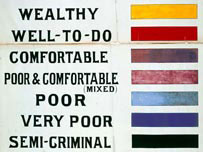
Today's Guardian says that "'
rogue elements' within the Russian state" are now suspected in Litvinenko's death. I assume that "rogue element" refers to the perpetrator, not the polonium. I've long been puzzled by the use of the word "rogue," as in "
rogue states". A rogue state seems to be a country that we deem irrational, so we don't need to talk to its rulers. The first two
definitions of rogue in dictionary.com are
1. a dishonest, knavish person; scoundrel.
2. a playfully mischievous person; scamp:
The youngest boys are little rogues.
Now, while I don't think for a minute that Litvinenko's killers are lovable scamps, I do think that these definitions contain an element of truth. After this summer's airline plot was announced,
Marina Hyde wrote a
wonderful column:
... for the past few years suspected terrorists have been mounting training exercises in the national parks of England and Wales, notably in the Lakes, Yorkshire Dales and Brecon Beacons. In many ways, this is unsurprising. As you will doubtless be aware, there is an unwritten British bylaw that decrees all residential improvement courses must take place in the Lake District. Cordon bleu cooking, watercolour painting (intermediate level), and now jihad - nowhere can these disciplines be better absorbed than in Wordsworth country...Soon after last year's London bombings, a photograph emerged that featured two of the perpetrators whitewater rafting in North Wales. Apparently this was the leisure activity during some kind of al-Qaida bonding weekend...It does not belittle murder to admit that that murder is being planned by a bunch of intense, lost, silly boys. But it should absolutely affect our response. Is it truly worthy of us to dismantle long-cherished legal freedoms for this lot? Quite how we will explain the decision to the proverbial grandchildren is hard to say.... This should not for a moment suggest that the danger from such people is not real. But being unable to laugh at it is a danger itself. It implies a critical lack of self-belief, suggesting virtues and values to be so tenuous that they can be shaken by Mittyish socio- or psychopaths, when the reality is that we will never be able to fully protect ourselves against some kinds of ingenuity.
 Today we walked from our flat through Bethnal Green to Hackney. On the way, we walked by Überhaus, which, despite its ludicrous name, may become London's answer to Rat Wharf. I finally found out how the term "hackneyed" arose: In the middle ages, Hackney was rural, and became famous for its horses. World Wide Words goes on:
Today we walked from our flat through Bethnal Green to Hackney. On the way, we walked by Überhaus, which, despite its ludicrous name, may become London's answer to Rat Wharf. I finally found out how the term "hackneyed" arose: In the middle ages, Hackney was rural, and became famous for its horses. World Wide Words goes on:


